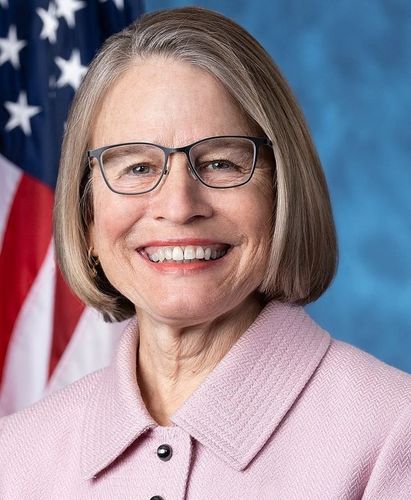Bill aims to allow corn ethanol to qualify as advanced biofuel

Rep. Mariannette Miller-Meeks, R-Iowa
May 26, 2023
BY Erin Voegele
A bill introduced in the U.S. House of Representatives on May 15 aims to allow corn ethanol to qualify as an advanced biofuel under the Renewable Fuel Standard. It would also require the U.S. EPA to use the Argonne GREET model to determine the greenhouse gas (GHG) emissions profile of biofuels.
The legislation, titled the Fuels Parity Act, was introduced by Reps. Mariannette Miller-Meeks, R-Iowa; Stephanie Bice, R-Okla.; Wesley Hunt, R-Texas; Eric Sorensen, D-Ill.; and Mikki Budzinski, D-Ill.
Under current RFS regulations, biofuels made from corn starch feedstock are unable to qualify as an advanced biofuel even if the resulting biofuel reaches or exceeds the required 50 percent GHG reduction threshold required for advanced biofuels. A statement released by Miller-Meeks stresses that no other feedstock is subject to such a limitation under the RFS. Allowing corn starch-based fuels to qualify as advanced biofuel would incentivize lower emissions from ethanol production and allow corn access to another bucket of the RFS, according to Miller-Meeks.
Advertisement
Advertisement
"As we look toward a cleaner energy future, it’s imperative we take an ‘any-of-the-above’ approach to energy production. Removing legal barriers that limit the use of corn-based ethanol will bolster American energy production and support our agriculture industry—all while lowering carbon emissions,” said Miller-Meeks. “I’m proud to lead this bipartisan legislation and honored to be joined by my colleagues from Texas, Oklahoma, and Illinois.”
Representatives of the Iowa Corn Growers Association, Poet, the National Corn Growers Association and Growth Energy have spoken out in support of the bill.
“With the support of Representative Miller-Meeks, we know we have someone that understands the value of ethanol and its role as a more sustainable fuel option to fight climate change on our side. We continue to fight for ethanol because it’s a low-carbon, homegrown fuel option that supports 62% of corn grind in our state,” said Denny Friest, Iowa Corn Growers Association president.
Advertisement
Advertisement
“As a stalwart champion of biofuels, we thank Representative Mariannette Miller-Meeks for her leadership in introducing the Fuels Parity Act,” said Joshua Shields, senior vice president of corporate affairs for Poet. “By eliminating the corn starch penalty and adopting the Department of Energy’s Argonne GREET model, which is the gold standard of carbon lifecycle analysis, this legislation paves the way for a more accurate modeling that better reflects the advancements ethanol has and continues to make as a low-carbon liquid fuel solution.”
“We applaud Rep. Miller-Meeks for introducing legislation that recognizes the declining carbon intensity of today’s low-carbon ethanol and helps level the playing field,” said Tom Haag, president of the National Corn Growers Association. “Farmers are proud to contribute to lowering ethanol’s carbon footprint through our production practices, and this bill would ensure EPA uses the most recent science and data to accurately measure the greenhouse gas reduction benefits of biofuels.”
“This bipartisan bill would clear two of the biggest regulatory hurdles that keep the U.S. from unleashing the full carbon-reducing potential of corn ethanol. By both allowing corn starch ethanol to qualify for an advanced (D5) RIN and ensuring EPA uses the gold-standard GREET lifecycle analysis model, the Fuels Parity Act would put biofuels on the same regulatory footing as other fuels, giving them a better chance to compete in the market and more opportunities to decarbonize the transportation sector. We’re grateful to Representatives Miller-Meeks, Hunt, Bice, Budzinski, and Sorenson for introducing this legislation,” said Emily Skor, Growth Energy CEO.
A full copy of the bill can be downloaded from Miller-Meeks’ website.
Related Stories
The U.S. EPA on July 8 hosted virtual public hearing to gather input on the agency’s recently released proposed rule to set 2026 and 2027 RFS RVOs. Members of the biofuel industry were among those to offer testimony during the event.
The U.S. exported 31,160.5 metric tons of biodiesel and biodiesel blends of B30 and greater in May, according to data released by the USDA Foreign Agricultural Service on July 3. Biodiesel imports were 2,226.2 metric tons for the month.
The USDA’s Risk Management Agency is implementing multiple changes to the Camelina pilot insurance program for the 2026 and succeeding crop years. The changes will expand coverage options and provide greater flexibility for producers.
EcoCeres Inc. has signed a multi-year agreement to supply British Airways with sustainable aviation fuel (SAF). The fuel will be produced from 100% waste-based biomass feedstock, such as used cooking oil (UCO).
President Trump on July 4 signed the “One Big Beautiful Bill Act.” The legislation extends and updates the 45Z credit and revives a tax credit benefiting small biodiesel producers but repeals several other bioenergy-related tax incentives.
Upcoming Events










